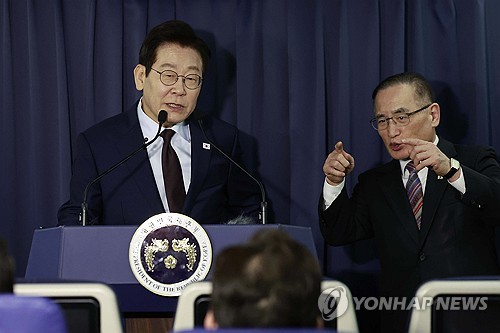
(Seoul=Yonhap Infomax) Ji Seo Jeong – President Lee Jae-myung stated that South Korea will take all necessary measures to ensure its national interests are not compromised amid rising tensions between China and Japan.
Speaking to reporters aboard Air Force One en route to Türkiye, the final stop of his Middle East and Africa tour on the 24th (local time), President Lee said, "We must closely monitor the situation with a cool head and do our utmost to prevent any harm to South Korea's national interests, while maximizing our gains."
He added, "Although it was a tight schedule, I managed to hold talks with the Chinese Premier and, in parallel, arranged a brief summit with the Japanese side to maintain balance."
President Lee emphasized, "During both summits, I thoroughly explained South Korea's fundamental positions and ensured there was no misunderstanding. From South Korea's perspective, there are no significant new threats or additional sources of conflict arising from these developments."
On November 23 (local time), President Lee held separate meetings with Japanese Prime Minister Sanae Takaichi and Chinese Premier Li Qiang on the sidelines of the G20 Summit in South Africa.
He reiterated, "The basic principle of South Korean diplomacy is to maintain the alliance with the United States as its foundation, while managing relations with China in a stable manner."
"At its core, this is a pragmatic, national interest-centered diplomacy," Lee said. "A key element is expanding South Korea's autonomy in all areas of military security."
He continued, "This includes regaining wartime operational control, building nuclear-powered submarines, and expanding economic cooperation and private exchanges with China—all of which are essential for South Korea's national interest."
President Lee also noted, "The alliance with the United States, which has been primarily military, should evolve into a comprehensive alliance encompassing economic and advanced technology sectors. These two aspects are not mutually exclusive."
He observed, "If mishandled, South Korea could end up caught in the middle, but with the right approach, we can mediate and adjust between both sides, thereby expanding our diplomatic room to maneuver."
Lee further stated, "In today's rapidly changing international order, if we accumulate strength, make independent judgments, maximize autonomy, and endure difficulties with a focus on national interest, our diplomatic horizon can broaden significantly by leveraging both sides."
"The new administration is steadfastly pursuing this path," he said. "From the perspective of Western countries, especially the United States, there is a desire to keep China in check. However, while containing China, it is also realistic to seek areas of active cooperation."
He stressed, "This is the nature of inter-state relations. If we approach international relations in an all-or-nothing manner, there will be nothing left in the end."
When asked about the significance of restoring the World Trade Organization (WTO) functions, as mentioned at the G20, President Lee responded, "A free trade order is virtually the only way for all countries to prosper together."
At the G20 Summit in Johannesburg, South Africa, President Lee proposed fundamental reforms for sustainable economic growth, the creation of a predictable trade and investment environment to boost growth potential, and enhanced development cooperation for emerging economies. He stated, "Restoring the WTO's functions serves the interests of all."
Lee emphasized, "Most countries, except for a few, agree that the multilateral system centered on the WTO must not be undermined, even though multilateralism has been significantly damaged."
"As seen from the remarks of leaders and heads of international organizations, there is consensus on the need to strengthen the free trade system and minimize its erosion," he explained.
Lee noted, "There are many discussions about combining the European Union (EU) with the Comprehensive and Progressive Agreement for Trans-Pacific Partnership (CPTPP), or grouping countries with similar interests. These efforts are responses to the perceived threat to the WTO system and attempts to create alternative structures."
He concluded, "Ultimately, free trade remains the only viable path for all nations to prosper together, so we must continue to advocate for it."
jsjeong@yna.co.kr
(End)
Copyright © Yonhap Infomax Unauthorized reproduction and redistribution prohibited.

